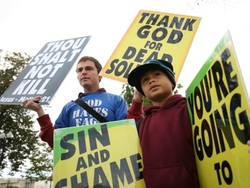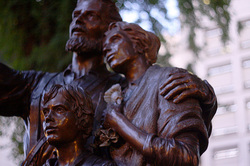The short-term view afflicts business as well as the church. Businesses often focus on short-term profits at the expense of long-term health and sustainability. Church leaders begin programs hoping they will increase numbers and excitement quickly, many times at the expense of long-term spiritual growth of people, which takes years to see fruit. At the end of 1 Sam., the people of Jabesh Gilead buried Saul and his sons under a tamarisk tree at Jabesh. Tamarisk trees are slow-growing and require much care, representing a long-term, other-centered perspective.
David learned the who, what, when, where and how in fighting spiritual battles resulting in good fruit that remains from obeying God. In contrast, forsaking God leads to bad fruit, as shown in Saul’s life.
The Philistines proceeded by 100s & 1000s while David and his men marched in the rear with Achish. He found no fault with David who had been with him for more than a year. The Philistine commanders were angry and afraid that if David was in battle with them, he might become an adversary. They remembered what the people sang, “Saul has slain his thousands, and David his tens of thousands” (1 Sam. 29:1-5). God leads you to fight the right spiritual battles in the world.
Achish told David to return in peace so he may not displease them. David arose early, he and his men, to return to the land of Philistines. The Philistines went up to Jezreel (1 Sam. 29:6-11). God protects from you from fighting other believers in the body of Christ.
Amalekites raided and burned Negev and Ziklag with fire and took the women and children captive. David and the people with him wept until there was no strength in them. All the people were bitter in soul and talked of stoning David, but he found strength in the Lord his God (1 Sam. 30:1-6). Find emotional strength in God in the midst of the spiritual battle.
David inquired of the Lord, “Shall I pursue this band? Shall I overtake them?” He said, “Pursue, for you shall surely overtake them, and you shall surely rescue all.” David and the 600 men came to Besor Ravine with 200 too exhausted to cross the ravine. David and 400 men continued the pursuit (1 Sam. 30:7-10). Ask direction from God whether to wait or take action in the spiritual battle.
They found an Egyptian, a servant of Amalekite, who was part of the raid on Ziglag. David asked if he would bring them to the raiding party (1 Sam. 30:11-15). God provides right connections and information in fighting spiritual battles.
While the band ate and drank, David slaughtered them from twilight until evening of the next day. Not a man escaped except 400 young men. David recovered all that the Amalekites had taken and rescued his two wives (1 Sam. 30:16-20). God allows you to be victorious in the spiritual battle.
David came to the 200 men who were too exhausted to fight. Evil men among David’s followers didn’t want to share the plunder. David said the Lord gave the plunder, protected them and defeated the forces against them. He said all would share equally (1 Sam. 30:21-25). God wants the whole body of Christ share equally in victory and celebration.
David sent some of the plunder as a gift to the elders of Judah who were his friends (Bethel, Ramoth, Aroer, Siphmoth, Eshtemoa, Racal, Jerahmeelites, Kenites, Hormah, Bor-ashan, Athach and Hebron) and to all places where David himself and all his men had roamed (1 Sam. 30:26-31). Victory in your spiritual battles benefits the whole city.
The Philistines fought against Israel and they fell slain, including Jonathan. Saul took his own sword and fell on it. His three sons, his armor bearer and all his men died together that same today. Men of Israel abandoned the cities and fled. Then the Philistines came and lived in them (1 Sam. 31:1-7). Disobedience and forsaking God lead to death and abandonment to sin.
The Philistines cut off Saul’s head, stripped off his armor and sent messengers throughout their land to proclaim new in the temple of their idols and among their people. They put his armor in the temple of the Ashtoreths and fastened his body to the wall of Beth Shan. The people of Jabesh Gilead took down the bodies of Saul and his sons and went to Jabesh where they burned them, buried their bones and fasted seven days (1 Sam. 31:8-13). Outcome of forsaking God leads to worldliness and idolatry, but obedience to God leads to other-centeredness and concern for the welfare of the next generation.
Study the applications on how to fight spiritual battles in the underlined sentences as illustrated in David’s life. Which one(s) most speak to you? Ask God to apply them in your life.







